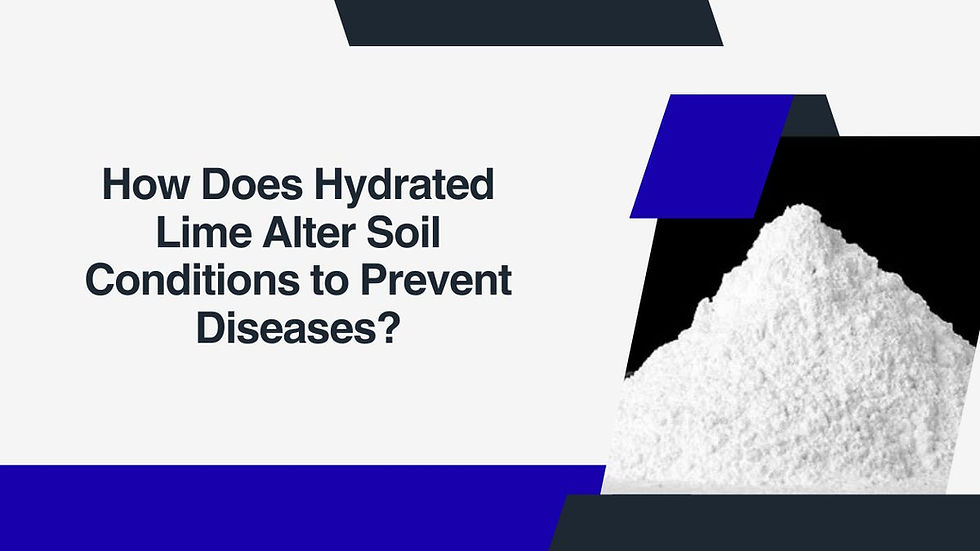How Does Hydrated Lime Alter Soil Conditions to Prevent Diseases?
- Shaurya Minerals
- Sep 5, 2025
- 3 min read
Soil health is the foundation of healthy crops, and farmers across the world know that the battle against soil-borne diseases starts beneath the surface. While fertilizers and pesticides can provide quick fixes, long-term solutions often come from natural soil amendments. One such solution is hydrated lime, also known chemically as calcium hydroxide. This powerful compound has been used for centuries to adjust soil properties and create conditions that discourage harmful pathogens.
In this blog, we’ll explore how Ca(OH)₂ works, why farmers rely on it, and what role it plays in building resilient soils for sustainable farming.

Understanding Hydrated Lime and Its Role in Agriculture
Hydrated lime is produced when quicklime reacts with water, forming a fine white powder that is alkaline in nature. Farmers apply it to fields to increase soil pH, manage acidity, and improve the overall soil environment. Unlike synthetic chemicals, hydrated lime powder works naturally to balance soil conditions and make them less favorable for harmful microbes that thrive in acidic soils.
Beyond just neutralizing soil acidity, Ca(OH)₂ helps in reducing the availability of toxic elements like aluminum and manganese that often hinder plant growth. By improving nutrient availability and creating a healthier soil ecosystem, it indirectly strengthens crops against diseases.
How Hydrated Lime Alters Soil Conditions to Prevent Diseases
Raising Soil pH Levels
Most soil-borne diseases, such as clubroot in cruciferous crops, are aggravated in acidic soils. Hydrated lime increases the pH, making the environment less suitable for the survival of these pathogens. A higher pH not only reduces harmful microbes but also improves beneficial microbial activity that supports plant health.
Enhancing Soil Structure
The calcium content in slaked lime improves soil aggregation. Better soil structure means improved aeration, reduced waterlogging, and enhanced root development. Since many pathogens thrive in poorly aerated, compacted, or waterlogged soils, Ca(OH)₂ indirectly limits their spread.
Suppressing Harmful Microorganisms
The alkaline environment created by slaked lime is hostile to certain fungi, bacteria, and nematodes that cause crop diseases. By altering the microbial balance, it encourages beneficial organisms that compete with or suppress harmful ones.
Boosting Nutrient Availability
Acidic soils often tie up essential nutrients, making them unavailable to crops. When hydrated lime corrects soil pH, it improves the solubility of key nutrients like phosphorus, calcium, and magnesium. Stronger plants with better nutrition are naturally more resistant to infections.
Reducing Toxic Elements
In acidic soils, aluminum and manganese can reach toxic levels, weakening plant roots and making them more vulnerable to diseases. Ca(OH)₂ neutralizes these toxic elements, strengthening plants and making them less susceptible.
Why Farmers Prefer Hydrated Lime
The benefits of using hydrated lime go beyond disease control. Farmers often choose it because:
It is a cost-effective and natural soil conditioner.
It improves both short-term and long-term soil fertility.
It reduces the dependency on chemical fungicides.
It helps build sustainable farming practices by improving soil biology.
Choosing the Right Hydrated Lime for Agriculture
Not all lime products are the same, and quality plays a major role in achieving the desired results. Trusted hydrated lime manufacturers and hydrated lime suppliers provide finely ground material that ensures effective soil penetration and faster results. When sourcing for agriculture, always look for certified and reliable options. A reputable Hydrated Lime manufacturer can ensure that the product meets industry standards, providing consistent performance in the field.
Safe Application Tips
While Ca(OH)₂ is natural, it must be handled carefully:
Always wear protective gloves and masks when handling it.
Apply based on soil testing results to avoid over-liming.
Distribute evenly across fields for maximum effectiveness.
Allow time for the lime to react with the soil before planting.
Conclusion
Soil-borne diseases can devastate crops, but farmers have a natural ally in Ca(OH)₂. By adjusting pH, improving soil structure, and reducing harmful pathogens, hydrated lime creates a healthier soil environment that supports strong, disease-resistant crops. For farmers seeking sustainable solutions, sourcing from reliable Ca(OH)₂ suppliers and working with an experienced Hydrated Lime Powder manufacturer ensures they get the best results.
When managed wisely, this simple soil amendment can become a cornerstone of healthier farming systems, proving that sometimes the oldest solutions remain the most powerful.




Comments